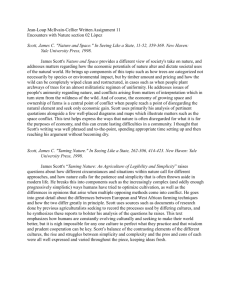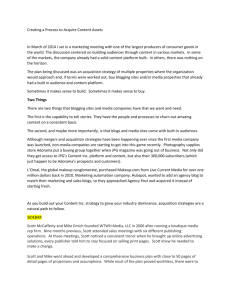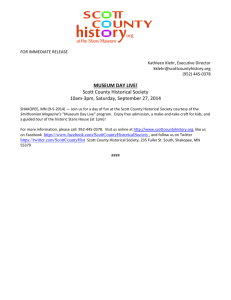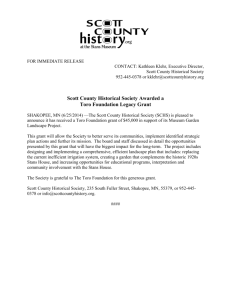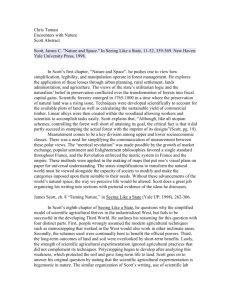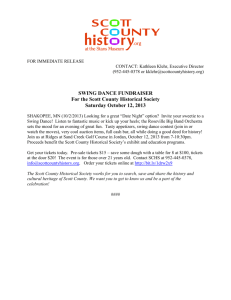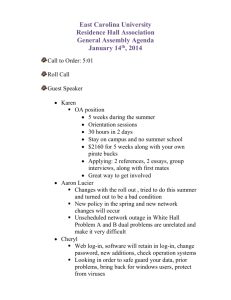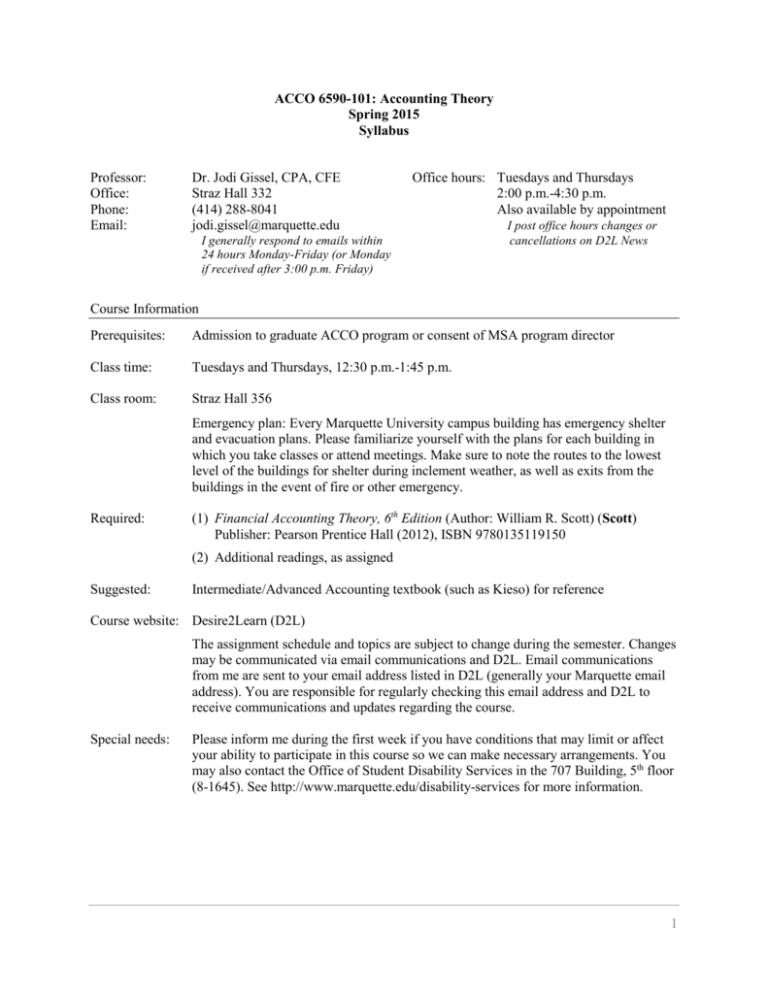
ACCO 6590-101: Accounting Theory
Spring 2015
Syllabus
Professor:
Office:
Phone:
Email:
Dr. Jodi Gissel, CPA, CFE
Straz Hall 332
(414) 288-8041
jodi.gissel@marquette.edu
Office hours: Tuesdays and Thursdays
2:00 p.m.-4:30 p.m.
Also available by appointment
I generally respond to emails within
24 hours Monday-Friday (or Monday
if received after 3:00 p.m. Friday)
I post office hours changes or
cancellations on D2L News
Course Information
Prerequisites:
Admission to graduate ACCO program or consent of MSA program director
Class time:
Tuesdays and Thursdays, 12:30 p.m.-1:45 p.m.
Class room:
Straz Hall 356
Emergency plan: Every Marquette University campus building has emergency shelter
and evacuation plans. Please familiarize yourself with the plans for each building in
which you take classes or attend meetings. Make sure to note the routes to the lowest
level of the buildings for shelter during inclement weather, as well as exits from the
buildings in the event of fire or other emergency.
Required:
(1) Financial Accounting Theory, 6th Edition (Author: William R. Scott) (Scott)
Publisher: Pearson Prentice Hall (2012), ISBN 9780135119150
(2) Additional readings, as assigned
Suggested:
Intermediate/Advanced Accounting textbook (such as Kieso) for reference
Course website: Desire2Learn (D2L)
The assignment schedule and topics are subject to change during the semester. Changes
may be communicated via email communications and D2L. Email communications
from me are sent to your email address listed in D2L (generally your Marquette email
address). You are responsible for regularly checking this email address and D2L to
receive communications and updates regarding the course.
Special needs:
Please inform me during the first week if you have conditions that may limit or affect
your ability to participate in this course so we can make necessary arrangements. You
may also contact the Office of Student Disability Services in the 707 Building, 5th floor
(8-1645). See http://www.marquette.edu/disability-services for more information.
1
Department of Accounting Mission Statement
The mission of the Department of Accounting in the College of Business Administration is to prepare
students to be responsible, competent and ethical leaders in accounting, business, government and
not-for-profit careers. Marquette’s undergraduate degree in accounting builds upon the liberal arts
requirements by emphasizing oral and written communication skills, ethical behavior, analytical
reasoning, computer competency, and technical knowledge sufficient for attaining a relevant
accounting profession. The Master of Science in Accounting (MSA) degree focuses on: (1) enhancing
the student’s knowledge in finance, management, and specific accounting areas, (2) preparing the
student for professional examinations (e.g., CPA, CMA, CIA, CPFO), and (3) qualifying students for
positions in public, corporate, or government/not-for-profit accounting.
We emphasize leadership and service through the internship program and activities of our student
chapter of Beta Alpha Psi. Students can meet the 150 hour requirement for certification either through
the undergraduate degree (with 150 credit hours), the MSA, or the Master of Business Administration
(including courses needed to qualify for the CPA examination). This information is also available at
http://business.marquette.edu/departments/accounting.
College of Business Administration Assessment Statement
The fundamental mission of the College of Business Administration is to provide a quality education
grounded in Catholic, Jesuit intellectual values. Students are expected to learn how to function
effectively in a diverse and global economy so that they may develop into ethically and socially
responsible global leaders and responsible members of their organizations and communities. As one
of many methods of assuring that the goals of our educational mission are successfully met, the
college regularly and systematically engages in the assessment of these competencies.
Students in the Bachelor of Science in Business Administration program are assessed on their ability
to reason ethically, communicate effectively, analyze critically, and understand local, national and
global business and cultural issues. Students in our MBA programs are also assessed on their
competency to communicate effectively, reason ethically and apply critical thinking, as well as their
capacity to comprehend the global strategic issues of firms and perform fundamental activities of
business managers. Students in our other graduate programs are assessed on specific competencies
related to their disciplines.
The Master of Science in Accounting (MSA) current learning outcomes (also available at
http://business.marquette.edu/academics/msa-learning-outcomes) are:
i.
ii.
iii.
iv.
v.
vi.
Apply critical thinking to accounting issues
Demonstrate effective written communication skills
Demonstrate effective oral communication skills
Apply professional knowledge skills of accounting
Analyze ethical issues
Analyze the international environment
Assessment takes place each semester in all programs and settings using quantifiable measures; that
information is gathered and analyzed to help continuously improve the educational process. The
College of Business Administration is dedicated to successfully providing a quality education for all
students. Assessment is the continuous improvement process of evaluating our success. More
information on assessment can be found at http://www.marquette.edu/assessment/ or in the assurance
of learning tabs under http://business.marquette.edu/academics/assurance-of-learning-undergrad or
http://business.marquette.edu/academics/assurance-of-learning-graduate.
2
Course Objectives
This course considers accounting from a theoretical perspective, with emphasis on current issues
under debate by Financial Accounting Standards Board (FASB). Primary course objectives are:
1. To understand and analyze the theoretical structure underlying financial accounting.
2. To understand how accounting theory relates to basic financial statements and standard setting.
3. To apply critical thinking, ethical reasoning, and research skills relating to standards, standard
setting, and case analyses.
4. To enrich communication skills.
Each of these primary course objectives relates to MSA goals to apply critical thinking to accounting
issues, to demonstrate effective communication skills, to apply professional knowledge skills of
accounting, to analyze ethical issues, and to analyze the international environment.
Course Policies
Statement on Academic Integrity
Students, faculty, and staff at Marquette University developed a Statement on Academic Integrity
that recognizes the importance of integrity, both personal and academic, and includes an Honor
Pledge and Honor Code applicable to all.
The Honor Pledge
I recognize the importance of personal integrity in all aspects of life and work. I
commit myself to truthfulness, honor, and responsibility, by which I earn the respect
of others. I support the development of good character and commit myself to uphold
the highest standards of academic integrity as an important aspect of personal
integrity. My commitment obliges me to conduct myself according to the Marquette
University Honor Code.
Student Obligations under the Honor Code
1. To fully observe the rules governing exams and assignments regarding resource material,
electronic aids, copying, collaborating with others, or engaging in any other behavior that
subverts the purpose of the exam or assignment and the directions of the instructor.
2. To turn in work done specifically for the paper or assignment, and not to borrow work
either from other students, or from assignments for other courses.
3. To give full and proper credit to sources and references, and to acknowledge the
contributions and ideas of others relevant to academic work.
4. To report circumstances that may compromise academic honesty, such as inattentive
proctoring or premature posting of answers.
5. To complete individual assignments individually, and neither to accept nor give
unauthorized help.
6. To accurately represent their academic achievements, which may include their grade
point average, degree, honors, etc., in transcripts, in interviews, in professional
organizations, on resumes and in the workplace.
7. To report any observed breaches of this honor code and academic honesty.
Please visit http://bulletin.marquette.edu/schoolofmanagement/academicregulations/.
3
Academic dishonesty
Academic dishonesty includes cheating, dishonest conduct, plagiarism, and collusion. In the
event of academic dishonesty, I follow the University’s procedures for incidents of academic
dishonesty. Please review the University’s academic honesty policies and procedures:
Definitions:
http://www.mu.edu/mucentral/registrar/policy_honesty-definitions.shtml
Consequences: http://www.mu.edu/mucentral/registrar/policy_honesty-consequences.shtml
Procedures:
http://www.mu.edu/mucentral/registrar/policy_honesty-procedures.shtml
Note: Students must submit electronic Microsoft Word versions of written assignments in
addition to printed versions. All written assignments are subject to a plagiarism detection service
such as ‘Turnitin’.
Grading distribution
Graded items percentage of final grade:
Participation
15%
Exams (3 at 20% each)
60%
Group project
25%
100%
Grade cut-offs:
A
93.00% – 100.0%
AB 88.00% – 92.99%
B
83.00% – 87.99%
BC 78.00% – 82.99%
C
72.00% – 77.99%
F
< 72.00%
Participation
Participation is essential to succeed in this course and to make this course a valuable experience
for everyone. Participation includes attending each class meeting, not arriving late or leaving
early, being prepared for class, asking thoughtful questions, providing meaningful insight to
discussions, and active involvement (for example, paying attention, voluntary participation, not
texting/emailing during class, not engaging in side conversations during class, contributing to inclass group activities).
Participation also includes appropriate etiquette with respect to cellular telephones (silence and
store in your bag during class) and laptops (relevant class-related use only). Both you and your
fellow classmates benefit from your appropriate course participation through minimized
distractions and shared experiences.
Being prepared for class is necessary for appropriate participation. You are responsible for
preparing for class by completing assigned pre-class readings and being able to discuss the
contents, as well as for giving thoughtful consideration to discussion questions in order to
facilitate in-class discussions and activities. Responses to discussion questions may not be
explicit in the readings – they are meant to be thought-provoking. You are responsible for all
assigned material, whether or not we specifically discuss it. Although we may not discuss every
detail of assigned material, it is important that you read all assigned material to gain
understanding of issues.
Attendance
The Marquette University Graduate School of Management considers regular class attendance an
important component of the learning process. Students are expected to attend scheduled class
meetings. Excessive absences may have adverse consequences, ranging from a lowered course
grade to forced withdrawal from the course. Excessive absence is generally defined as missing
more than 10-15% of regularly scheduled class time (including arriving late or leaving early). If
you arrive late, you are responsible for notifying me of your attendance at break or after class.
4
Exams
Exams test your understanding of course material, as well as your critical thinking skills,
analytical skills and ability to apply knowledge. Question types may include multiple choice,
matching, short answer, essay questions, and/or case problems. Exam material draws heavily
from lecture material and in-class discussions and activities, as well as pre-class readings.
You must take the exams during the scheduled times, except in extreme circumstances (limited to
severe illness, death in your immediate family, unavoidable legal obligations such as jury duty, or
University-authorized absence such as athletic travel). I must receive appropriate documentation
and approve requests no later than one week before the related exam date, except in cases of
emergency (severe illness, accident, or death in your immediate family). If these conditions are
not met, you will not be given a make-up exam and will not receive credit for the missed exam. If
these conditions are met, but I determine it is not possible to schedule a make-up exam within a
timely manner, your final grade will be based on relative proration of remaining graded items.
Exam retention policy: I distribute your graded exams for you to review in class. However, you
may not remove your exams from the classroom or copy/scan/photograph the exams in any way.
Failure to return your exam to me before leaving the classroom may result in a zero grade for the
exam. You are welcome to review your exams during my office hours or by appointment as well.
Group project
You will complete one group project, preparing a written report analyzing an issue that requires
research and application of accounting standards, as well as critical assessment. The written
report is due Friday, March 6. Details and requirements are forthcoming.
Class cancellations
In the event of inclement weather, the Office of the Provost makes the decision to cancel courses.
If the University officially closes during a scheduled exam time, the exam will be given during
the next available class meeting. If the University officially cancels classes during finals week,
students will receive the grade earned to date.
Course Schedule
Schedule is subject to change during the semester. You are responsible for checking D2L News for any changes.
Date
Pre-Class Reading and Discussion Questions
T 1/13
HISTORY OF ACCOUNTING PROFESSION AND ACCOUNTING THEORY
Required Reading
Scott Chapter 1
NOTE: On February 12, we will work with the FASB Codification in class. Prior to that
time, you are responsible for reading and completing twelve lessons. I suggest you not leave
these lessons until the last minute, but work through them over the next few weeks.
R 1/15
ACCOUNTING THEORY FOUNDATIONS
Required Reading
Devine (1960) Research methodology and accounting theory formation
5
Date
Pre-Class Reading and Discussion Questions
T 1/20
ACCOUNTING UNDER IDEAL CONDITIONS
Required Reading
Scott Chapter 2
Discussion Questions
Scott Chapter 2 Questions & Problems 7, 8, 10, 13
R 1/22
THE CONCEPTUAL FRAMEWORK AND STANDARD SETTING
Required Reading
FASB Concepts Statement No. 8 Conceptual Framework for Financial Reporting
Read only
Intro “Statements of Financial Accounting Concepts” (2 pages before Contents)
Chapter 1 (para.OB1-OB21)
Chapter 3 (para.QC1-QC39)
FASB International Convergence of Accounting Standards – A Brief History
Schipper (2003) Principles-based accounting standards
Shortridge and Myring (2004) Defining principles-based accounting standards
Discussion Questions
1. Why are concepts statements not GAAP? How does the conceptual framework relate
to standard setting?
2. Why is it important to identify qualitative characteristics of useful financial
information?
3. What are factors that may influence development of accounting systems?
4. Why did international accounting standards gain attention?
5. Should FASB pursue principles-based standards, or should US accounting standards
remain primarily rules-based? Would principles-based standards improve quality and
transparency of US financial accounting and reporting?
6. Are financial statements comparable under current US standards? Would financial
statements be comparable if US standards become principles-based?
T 1/27
STANDARD SETTING PROCESS: ECONOMIC ISSUES
Required Reading
Scott Chapter 12
Discussion Questions
Scott Chapter 12 Questions & Problems 1, 3, 4, 5, 6
R 1/29
STANDARD SETTING PROCESS: POLITICAL ISSUES
Required Reading
Scott Chapter 13
Discussion Questions
Scott Chapter 13 Questions & Problems 1, 2, 3, 15
T 2/3
FASB PROJECT ON REVENUE RECOGNITION
Required Reading
FASB ASU No. 2014-09 Revenue from Contracts with Customers (Topic 606)
Read only Summary (pp.1-11)
Discussion Questions
1. Why did FASB believe improvements were necessary in how companies recognize
revenue in financial reporting?
2. How does the new guidance improve over previous standards?
6
Date
Pre-Class Reading and Discussion Questions
R 2/5
FASB PROJECT ON REVENUE RECOGNITION
Required Reading
AICPA Insights: 12 revenue recognition concerns
Tysiac (2014) Substantial new disclosures required by revenue standard
Ciesielski (2014) Can investors win in a new era of accounting?
Tysiac (2014) Revenue transition group debates difficult implementation issues
Discussion Questions
1. What are some concerns relating to the new revenue recognition guidance?
2. What are implications of the new guidance beyond financial reporting?
T 2/10
Exam
R 2/12
US GAAP & THE FASB CODIFICATION
Required Reading
FASB Statement of Financial Accounting Standards (SFAS) No. 168
Read only Introduction, Objective, Standards of Financial Reporting (para.1-13)
FASB Learning Guide for the Codification Research System Professional View
Read Lessons 1-12 and access the Codification as instructed in the text and “Try It
Now” boxes before class. You do not have to complete Questions, Exercises, or
Problems at the end of Lessons. We will work through a selection of these in class.
You must use this website (login will not give you access using the FASB website)
Website:
http://aaahq.org/ascLogin.cfm
Username: AAA51688
Password: X4yK8yB (case sensitive)
Discussion Questions
1. Why did FASB develop the Codification?
2. What if accounting treatment is not specified within authoritative GAAP? Are there
cases where entities may still need to refer to pre-Codification guidance?
* We will access the Codification during class. If you have a laptop, please bring it to class.
T 2/17
THE DECISION USEFUL APPROACH TO FINANCIAL REPORTING
Required Reading
Scott Chapter 3
Discussion Questions
Scott Chapter 3 Questions & Problems 6, 11
R 2/19
THE DECISION USEFUL APPROACH TO FINANCIAL REPORTING
T 2/24
EFFICIENT SECURITIES MARKETS
Required Reading
Scott Chapter 4
Discussion Questions
Scott Chapter 4 Questions & Problems 1, 4, 6
R 2/26
EFFICIENT SECURITIES MARKETS
T 3/3
THE INFORMATION APPROACH TO DECISION USEFULNESS
Required Reading
Scott Chapter 5
Discussion Questions
Scott Chapter 5 Questions & Problems 1, 2, 3, 5, 13
R 3/5
THE INFORMATION APPROACH TO DECISION USEFULNESS
F 3/6
Group Project DUE
continued discussion
continued discussion
continued discussion
7
Date
Pre-Class Reading and Discussion Questions
T 3/10
NO CLASS – SPRING BREAK
R 3/12
NO CLASS – SPRING BREAK
T 3/17
THE MEASUREMENT APPROACH TO DECISION USEFULNESS
Required Reading
Scott Chapter 6
Discussion Questions
Scott Chapter 6 Questions & Problems 1, 2, 3, 6, 12
R 3/19
THE MEASUREMENT APPROACH TO DECISION USEFULNESS
T 3/24
MEASUREMENT APPLICATIONS
Required Reading
Scott Chapter 7
Discussion Questions
Scott Chapter 7 Questions & Problems 1, 8, 12
R 3/26
MEASUREMENT APPLICATIONS
T 3/31
Exam
R 4/2
NO CLASS – EASTER HOLIDAY
T 4/7
ECONOMIC CONSEQUENCES AND POSITIVE ACCOUNTING THEORY
Required Reading
Scott Chapter 8
Discussion Questions
Scott Chapter 8 Questions & Problems 1, 3, 5, 7
R 4/9
ECONOMIC CONSEQUENCES AND POSITIVE ACCOUNTING THEORY
T 4/14
AN ANALYSIS OF CONFLICT
Required Reading
Scott Chapter 9
Discussion Questions
Scott Chapter 9 Questions & Problems 1, 2, 5, 6, 20
R 4/16
AN ANALYSIS OF CONFLICT
T 4/21
EXECUTIVE COMPENSATION
Required Reading
Scott Chapter 10
Discussion Questions
Scott Chapter 10 Questions & Problems 2, 3, 5
R 4/23
EXECUTIVE COMPENSATION
T 4/28
EARNINGS MANAGEMENT
Required Reading
Scott Chapter 11
Discussion Questions
Scott Chapter 11 Questions & Problems 1, 2, 12
R 4/30
EARNINGS MANAGEMENT
F 5/8
Exam (10:30 AM-12:30 PM)
continued discussion
continued discussion
continued discussion
continued discussion
continued discussion
continued discussion
8

